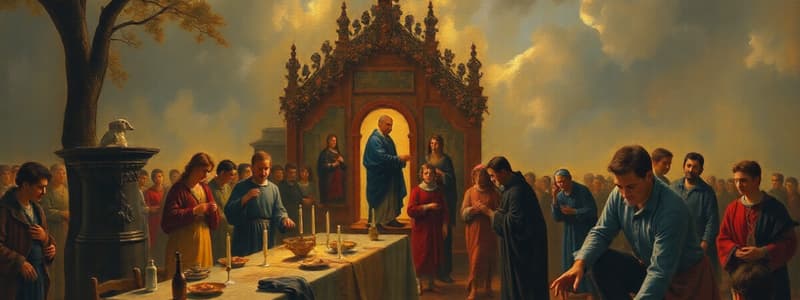Podcast
Questions and Answers
Which functionalist theorist argued that religion helps individuals cope with disruptive events?
Which functionalist theorist argued that religion helps individuals cope with disruptive events?
- Otto Maduro
- Malinowski (correct)
- Carl Marx
- Max Weber
According to Marx, how does religion affect the existing social order?
According to Marx, how does religion affect the existing social order?
- It promotes social equality for all classes.
- It justifies the existing class structure and prevents change. (correct)
- It provides financial independence to the poor.
- It encourages revolution and social reform.
What did Otto Maduro recognize about the role of religion in society?
What did Otto Maduro recognize about the role of religion in society?
- It prevents any form of social change in all contexts.
- It is irrelevant to the understanding of class dynamics.
- It can be both a force for social change and a means of preservation. (correct)
- It is solely a tool for social control.
What is Max Weber's key argument in 'Protestant Ethic and the Spirit of Capitalism'?
What is Max Weber's key argument in 'Protestant Ethic and the Spirit of Capitalism'?
What notion does Marx highlight regarding striving for social change in one's lifetime?
What notion does Marx highlight regarding striving for social change in one's lifetime?
Which sociological perspective argues that religion acts as a barrier to social change?
Which sociological perspective argues that religion acts as a barrier to social change?
What viewpoint do some Feminists hold regarding religion and social change?
What viewpoint do some Feminists hold regarding religion and social change?
Who is a key theorist that argues religion can be a force for social change?
Who is a key theorist that argues religion can be a force for social change?
Traditional Marxists generally believe that religion serves to:
Traditional Marxists generally believe that religion serves to:
What common belief is shared by Functionalists and Traditional Marxists regarding religion?
What common belief is shared by Functionalists and Traditional Marxists regarding religion?
Flashcards are hidden until you start studying
Study Notes
### Religion and Social Change
- Some sociologists theorize that religion prevents social change, while others argue that religion can be a driver of social change.
Religion Preventing Social Change
- Functionalist thinkers such as Malinowski and Parsons argued that religion provides social stability.
- Marx believed that religion maintains the status quo.
- He argued that religion justifies the existing, unequal social order and prevents social change by making a virtue out of poverty and suffering.
- Religion also teaches people that it is pointless striving for revolution and focuses on "being good" for heavenly rewards.
### Religion as a Force for Social Change
- Max Weber argued that the Protestant work ethic was a contributing factor to the rise of capitalism in the 17th century.
- Neo-Marxist Otto Maduro argued that the Catholic Church in Latin America tended to prevent social change by aligning with the powerful economic and political class.
- He also recognized the potential for religion to drive social change, especially when marginalized communities have limited options to voice grievances.
- Martin Luther King, Jr. and the Baptist Church were influential in the Civil Rights movement in the U.S.
- The movement helped to end segregation and secure more equal political rights for Black Americans.
- Martin Luther King, Jr. was inspired by Gandhi's nonviolent direct action.
- The Arab Spring is a contemporary example of how religion can be a force for social change.
- Islamic groups actively used social media to highlight political injustices in countries such as Tunisia and Egypt.
- Samuel Huntington argued that globalization has made religion more central to identity. He believes fundamentalism and Western civilization clash, driving negative social change.
Religion, Secularization, and Social Change
- Secularization may decrease the power of religion to either prevent or cause social change.
Studying That Suits You
Use AI to generate personalized quizzes and flashcards to suit your learning preferences.



